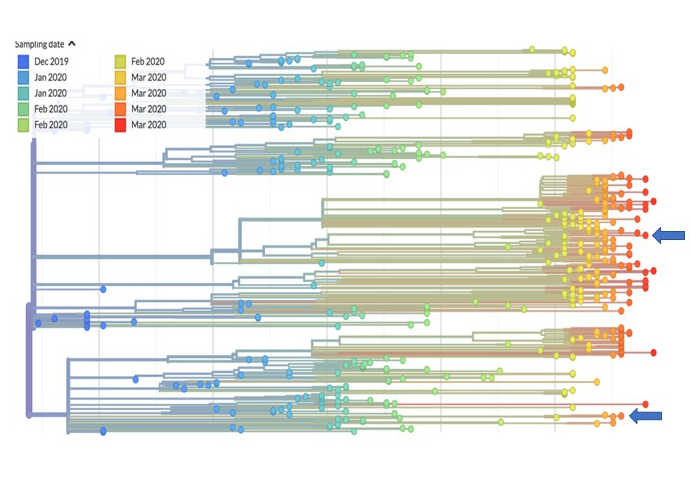
The coordinated work of virologists, epidemiologists and bioinformaticians has made it possible to obtain the first genome sequence of a SARS-CoV-2 coronavirus from two patients from the Hospital Clínic Universitari de València. The project involves researchers and technicians from the Institute for Integrative Systems Biology (I2SysBio, a joint centre University of Valencia-CSIC) and the Foundation for the Promotion of Health and Biomedical Research in the Valencian Community (FISABIO).
The authors of the work, carried out by the Sequencing and Bioinformatics Service of FISABIO and by the Molecular Epidemiology Research Group of I2SysBio, led by Fernando González-Candelas, Professor of Genetics at the University of Valencia, made public on Friday 13 March in the afternoon the genome of the emerging coronavirus isolated by the Microbiology Service of Hospital Clínic Universitari de Valencia. The information was uploaded in the GISAID Initiative database and is now available to the entire scientific community. The data can also be retrieved from Nextstrain, a platform that allows the spatial and temporal progression of the pandemic to be visualised from the more than 400 genomes from 40 different countries that have already been deposited since last December.
Knowing the details of the viral genomes as they mutate is essential for designing and evaluating diagnostic tests and for following the outbreak in real time, as it progresses, something that was technically not possible a few years ago. Studying the evolution of the virus and how it spreads in the population is essential to fight the epidemic. For their study, which will continue with the sequencing of more genomes, the Valencian group has benefited from their extensive experience in molecular epidemiology and third-generation sequencing techniques, based on nanopores.
Speaking with the SINC agency, Fernando González-Candelas has acknowledged that they have been able to measure the rate of mutation of the virus, which is lower than that of the flu, but that there is still not enough data to know whether the transmission capacity or the aggressiveness of the pathogen is changing.
Fernando González-Candelas heads the research group on Molecular Epidemiology integrated in the Program Pathogen Systems Biology at I2SysBio, which also includes the groups of Viral Biology, Experimental Evolution of Viruses, Evolutionary Systems Virology and Bacterial Pathogenomics. González-Candelas' group is also part of the Joint Unit on Evolution and Health, FISABIO-University of Valencia.
Through social networks, the I2SysBio research groups have offered their material and personal equipment to the health authorities of the Generalitat Valenciana. Similarly, they are participating in state-wide initiatives, such as the one led by the CSIC, to tackle the new coronavirus pandemic.
More information
- Sequencing and Bioinformatics Service of FISABIO
- FISABIO
- Hospital Clínic Universitari de València
- Research groups I2SysBio:
SOURCE: Mónica G. Salomone, SINC Agency











